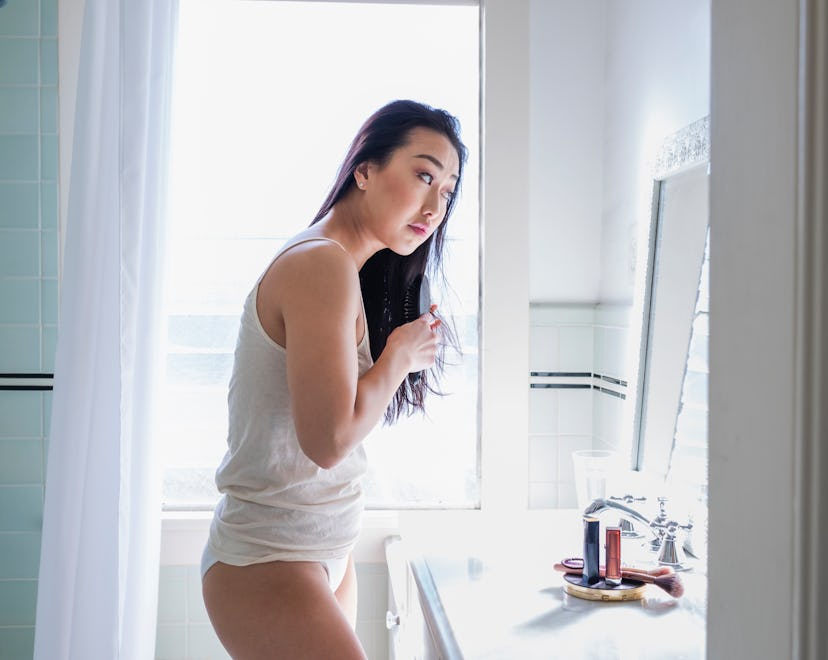Pregnancy

All About Hair Loss During Pregnancy
It’s more common than you think, and it doesn’t always happen after the baby is born.
Many moms find immense joy in their pregnancy hair. For some, it gets thick, illustrious, gorgeous, and strong. For others, however, it gets thinner, dried out, and appears to be falling out as evidenced by those bald patches at their temples or all over their scalp. Hair loss during pregnancy is definitely a real thing that doesn’t get talked about enough. We always hear about the gorgeous pregnancy hair, but not if your body decides to go the opposite direction. For moms who may be feeling left out of the glowing, growing, and thriving mane part of pregnancy, here’s what you need to know about pregnancy hair loss. Why does pregnancy hair loss happen, and most importantly, does it grow back?
What causes hair loss during pregnancy?
Like most issues that arise during pregnancy, you can thank those wild and crazy hormones for pregnancy hair loss, according to Dr. Enrizza P. Factor, a dermatologist and researcher. “The hormone changes that occur as a result of being pregnant can cause hair loss. This is because an increase in estrogen — and the corresponding decrease in progesterone — can lead to hair thinning and shedding,” she says. “Increased estrogen levels alter the natural hair cycle on your head. It can affect every woman differently, which is why some women experience thicker, shinier hair and some experience limper, thinner hair,” Factor says.
“The stress of pregnancy can induce telogen effluvium, or stress-related hair thinning,” says Dr. Anne Kennard, M.D., an OB-GYN, herbalist, and nutritionist. With rising estrogen levels and nutrient deficiencies as the body adjusts to support the baby, regular hair growth and shedding phases can be interrupted,” she says.
What to do if you’re experiencing pregnancy hair loss
If you’re losing hair during pregnancy, there are a few things you can do, according to Factor. She recommends you should strive to be getting the right nutrients — both on your hair and inside of your body. Eating well and continuing to take your prenatal vitamins can help with pregnancy hair loss, as well as “going easy on your hair.” She says to be extra gentle to prevent excess hair loss. This means no dying, no heat, no tight styles.
Reduce stress where possible, suggests Kennard, and use targeted supplementation (such as taking biotin or other supplements for hair growth), and aim for getting restorative sleep if you can. Always check in with your health care provider, though, before starting any supplements — especially during pregnancy.
Will hair grow back after birth?
The short answer is yes. Hair does grow back after birth. “Unless you’re doing other things that can damage your hair (like over-processing it or pulling it into tight styles), your locks will eventually go back to normal,” Factor says. “While it’s emotionally distressing to lose more hair than usual, most people who experience hair thinning from a stressful event — yes, having a baby is considered a stressor by your body — can recover. With a little patience, hair grows back after six to 15 months and often gets back to its prior growth cycle from then on,” she says.
So fret not. Pregnancy hair loss is normal, as everyone’s body reacts to pregnancy and the raging hormones that come with it — a little differently, and the hair you’ve lost will likely grow back within a year or so postpartum. In the meantime, be gentle with your hair, eat as healthfully as possible.
Experts:
Dr. Enrizza P. Factor, M.D., dermatologist, and a researcher at myvitiligoteam.com.
Dr. Anne Kennard, M.D., an OB-GYN, herbalist, and nutritionist.